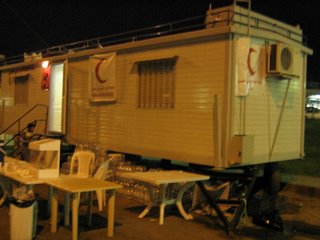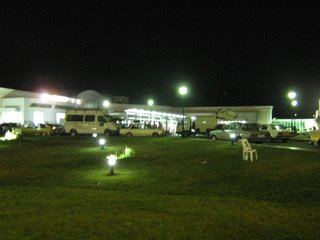The Old City is now full of parked cars with Lebanese number plates (plus cars from other countries in the region - tourists from Saudi Arabia, Jordan, Kuwait and the UAE whose holidays in Lebanon have been cut short by the current crisis). Schools, orphanages and other public halls are being used to house the influx of refugees. Last night I passed a mosque in the Old City where volunteers working for an undisclosed religious foundation were unloading supplies from a couple of Suzuki trucks in order to feed the refugees housed within. They said they had been working for 12 hours non-stop in order to provide assistance. It is clear that, although the chaos of last weekend (concentrated in the centre of the New City, around the Syrian Red Crescent office, the foreign money exchanges and the airline offices) has subsided, the scope of this refugee crisis is still very much on the increase, as more and more spaces across the city are commandeered to provide accomodation. Today there were several dozen people from Lebanon who have newly arrived at make-shift shelters on just one street in the Old City. Damascus was a teeming city even before these new arrivals. It looks as if before this tragic mess is resolved it's going to get a whole lot more congested.
Paul Cochrane has a piece in Open Democracy on what he calls the Syria Safety Zone, in which he explores the issue of Lebanese refugees in more detail.
Lebanon Updates have posted this map showing the areas of Lebanon attacked by the Israelis from 12-26 July:

It clearly shows that Israel has attacked targets across Lebanon including all the ports, major roads and border crossings. It also quite clearly shows that the volume of bombing has been greatest in south Beirut and south of the Litani river.
This site also mentions another feature of the conflict that has received no attention from mainstream news: the Israeli attack on the Jiyeh power station has released 10-15,000 tonnes of heavy fuel into the Med - possibly the worst ever environmental disaster in the Med - and it is now ruining the beautiful Lebanese coastline. Given the former importance of tourism to the Lebanese economy, this is both an environmental and an economic disaster (and we haven't even started to talk about Depleted Uranium...).
Meanwhile, Britain is doing all it can to bring about a peaceful resolution of the crisis by acting as a staging post for the delivery of bunker-busting bombs from the US to Israel.
Interesting fact of the day: According to the Lebanese Parliamentary Speaker, since 2000 Hizbu'llah have violated the Blue Line dividing Israel from Lebanon about 100 times. In contrast Israel has violated that line over 11,000 times! (source: The Angry Arab News Service
Interesting fact of the day 2: Hizbu'llah is widely believed to be Lebanon's second biggest employer - aside from a political party and militia they run schools, hospitals, orphanages and other services. The popular TV station al-Manar is also closely linked with Hizbu'llah.




